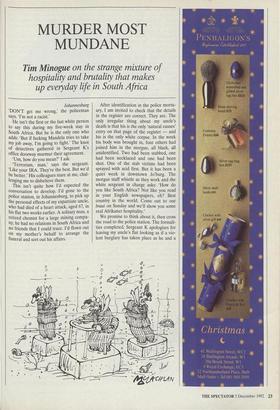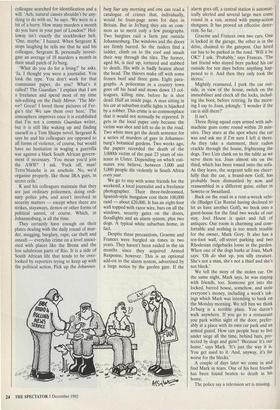MURDER MOST MUNDANE
Tim Minogue on the strange mixture of hospitality and brutality that makes up everyday life in South Africa
Johannesburg 'DON'T get me wrong,' the policeman says. `I'm not a racist.'
He isn't the first or the last white person to say this during my five-week stay in South Africa. But he is the only one who adds: 'But if fucking Mandela tries to take my job away, I'm going to fight.' The knot of detectives gathered in Sergeant K's office doorway murmur their agreement. 'Urn, how do you mean?' I ask. 'Terrorism, man,' says the sergeant. 'Like your IRA. They're the best. But we'd be better.' His colleagues stare at me, chal- lenging me to disbelieve them. This isn't quite how I'd expected the conversation to develop. I'd gone to the police station, in Johannesburg, to pick up the personal effects of my expatriate uncle, who had died of a heart attack, aged 67, in his flat two weeks earlier. A solitary man, a retired chemist for a large mining compa- ny, he had no relations in South Africa and no friends that I could trace. I'd flown out on my mother's behalf to arrange the funeral and sort out his affairs. After identification in the police mortu- ary, I am invited to check that the details in the register are correct. They are. The only irregular thing about my uncle's death is that his is the only 'natural causes' entry on that page of the register — and his is the only white corpse. In the week his body was brought in, four others had joined him in the morgue, all black, all unidentified. Two had been stabbed, one had been necklaced and one had been shot. One of the stab victims had been sprayed with acid first. But it has been a quiet week in downtown Jo'burg. The morgue staff whistle as they work and the white sergeant in charge asks: 'How do you like South Africa? Not like you read in your English newspapers, eh? Best country in the world. Come out to our braai on Sunday and we'll show you some real Afrikaner hospitality.'
We promise to think about it, then cross the road to the police station. The formali- ties completed, Sergeant K apologises for leaving my uncle's flat looking as if a vio- lent burglary has taken place as he and a colleague searched for identification and a will. `Ach, natural causes shouldn't be any- thing to do with us,' he says. 'We were in a bit of a hurry. How many murders a month do you have in your part of London?' Hol- loway isn't exactly the stockbroker belt. 'One, maybe,' I hazard. When Sergeant K stops laughing he tells me that he and his colleague, Sergeant B, personally investi- gate an average of 18 murders a month in their small patch of Jo'burg.
'What do you do for a living?' he asks. `Ja, I thought you were a journalist. You look the type. You don't work for that communist paper, do you? What's it called? The Guardian.' I explain that I am a freelance and spend most of my time sub-editing on the Daily Mirror. 'The Mir- ror? Great! I loved those pictures of Fer- gie's tits! We saw them over here.' The atmosphere improves once it is established that I'm not a commie Guardian writer, but it is still like waking up and finding oneself in a Tom Sharpe novel. Sergeant K says he and his colleagues are opposed to all forms of violence, of course, but would have no hesitation in waging a guerrilla war against a black South African govern- ment if necessary. 'You mean you'd join the AWB?' I ask. 'Fuck off, man! Terre'blanche is an arsehole. No, we'd organise properly, like those IRA guys, in secret cells.'
K and his colleagues maintain that they are just ordinary policemen, doing ordi- nary police jobs, and aren't involved in security matters — except when there are strikes, stayaways, demos or other forms of political unrest, of course. Which, in Johannesburg, is all the time.
They certainly have enough on their plates dealing with the daily round of mur- der, mugging, burglary, rape, car theft and assault — everyday crime on a level associ- ated with places like the Bronx and the less salubrious parts of Rio. It is a side of South African life that tends to be over- looked by reporters trying to keep up with the political action. Pick up the Johannes- burg Star any morning and one can read a catalogue of crimes that, individually, would be front-page news for days in Britain. But in Jo'burg they are so com- mon as to merit only a few paragraphs. Two burglars raid a farm just outside Johannesburg. The windows and the doors are firmly barred. So the raiders find a ladder, climb on to the roof and smash their way through the tiles. The farmer, aged 84, is tied up, tortured and stabbed to death. His wife is badly beaten about the head. The thieves make off with some frozen beef and three guns. Eight para- graphs. A policeman in a country town goes off his head and mows down 13 col- leagues, killing nine, before he is shot dead. Half an inside page. A man sitting in his car at suburban traffic lights is hijacked by a robber. This crime is so commonplace that it would not normally be reported. It gets in the local paper only because the victim was shot and left to die in the road. Two white men get the death sentence for a series of murders of gays in Johannes- burg's botanical gardens. Two weeks ago, the papers recorded the death of the 3,000th victim of the past 23 years of vio- lence in Ulster. Depending on which esti- mates you believe, between 3,000 and 5,000 people die violently in South Africa every year.
We go to stay with some friends for the weekend, a local journalist and a freelance photographer. Their three-bedroomed, Spanish-style bungalow cost them 100,000 rand — about £20,000. It has an eight-foot wall topped with razor wire, bars on all the windows, security gates on the doors, floodlights and an alarm system, plus two dogs. A typical white suburban home, in fact.
Despite these precautions, Graeme and Frances were burgled six times in two years. They haven't been raided in the six months since they acquired Armed Response, however. This is an optional add-on to the alarm system, advertised by a large notice by the garden gate. If the alarm goes off, a central station is automat- ically alerted and several large men come round in a van, armed with pump-action shotguns. It has proved an effective deter- rent. So far.
Graeme and Frances own two cars. One is locked in the garage, the other is in the drive, chained to the gatepost. Our hired car has to be parked in the road. 'Will it be OK?' I ask. 'Probably,' says Frances. The last friend who stayed here parked his car outside for ten days before anything hap- pened to it. And then they only took the stereo.'
Mightily reassured, I park the car out- side, in view of the house, switch on the immobiliser and check all the locks, includ- ing the boot, before retiring. In the morn- ing I say to Joan, jokingly: 'I wonder if the car is still there?'
It isn't.
Three flying squad cops armed with sub- machine guns come round within 20 min- utes. They stare at the spot where the car was and ask me if I'm sure I left it there. As they take a statement, their radios crackle through the house, frightening the dogs. Two Uzis clank on to the table as we serve them tea. Joan almost sits on the third, which has been tossed onto the sofa. As they leave, the sergeant tells me cheer- fully that the car, a brand-new Golf, has probably been dismantled by now and reassembled in a different guise, either in Soweto or Swaziland.
Back on the road in a rent-a-wreck vehi- cle (Budget Car Rental having declined to let us have another Golf), we book into a guest-house for the final two weeks of our stay. Joel House is quiet and full of antiques. Our room is charming and com- fortable and nothing is too much trouble for the owner, Mark Gory. It also has a ten-foot wall, off-street parking and two Rhodesian ridgebacks loose in the garden. When one of the dogs barks at Joan, Mark says: 'Oh do shut up, you silly creature. She's not a man, she's not a thief and she's not bleck.'
We tell the story of the stolen car. On the same night, Mark says, he was staying with friends, too. Someone got into the locked, barred house, somehow, and stole everyone's money, including a week's tak- ings which Mark was intending to bank on the Monday morning. We tell him we think Jo'burg is a terrible place. You daren't walk anywhere. If you go to a restaurant you park within sight of the door, prefer- ably at a place with its own car park and an armed guard. How can people bear to live under siege all the time, behind bars, pro- tected by dogs and guns? 'Because it's our home,' says Mark. 'It's just the way it is. You get used to it. And, anyway, it's far worse for the blecks.'
A couple of days later we come in and find Mark in tears. One of his best friends has been found beaten to death in his home.
The police say a television set is missing.











































































 Previous page
Previous page